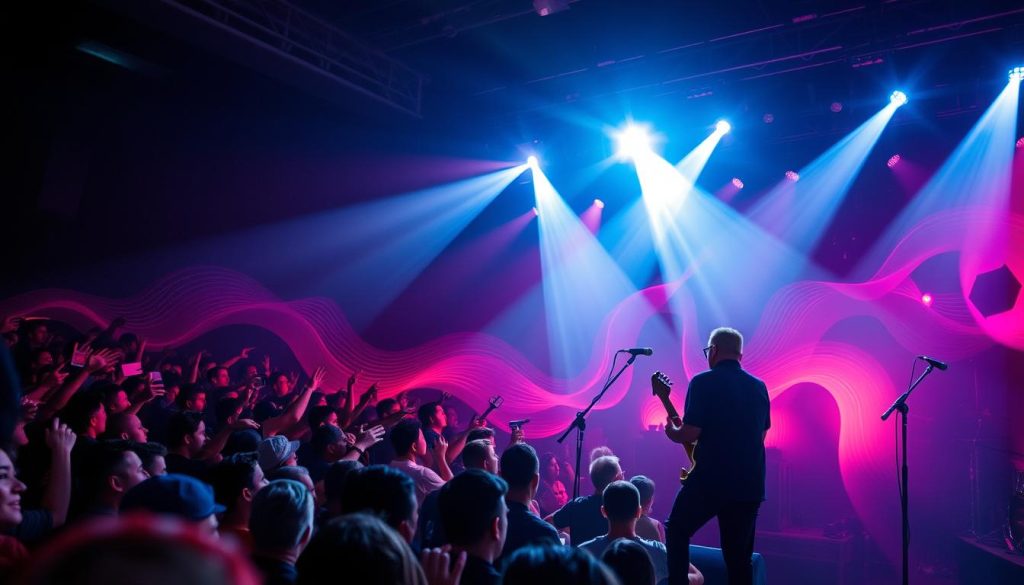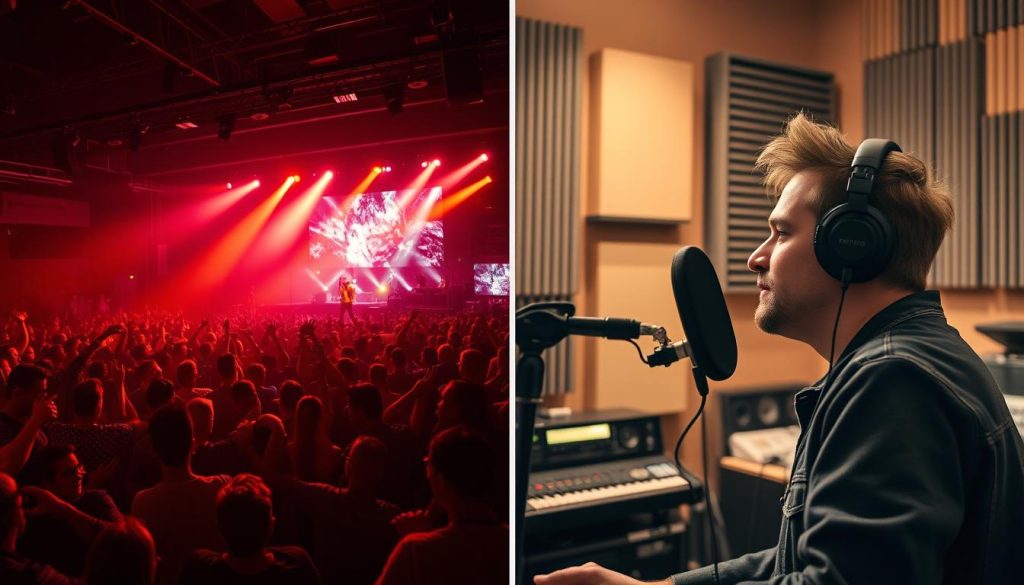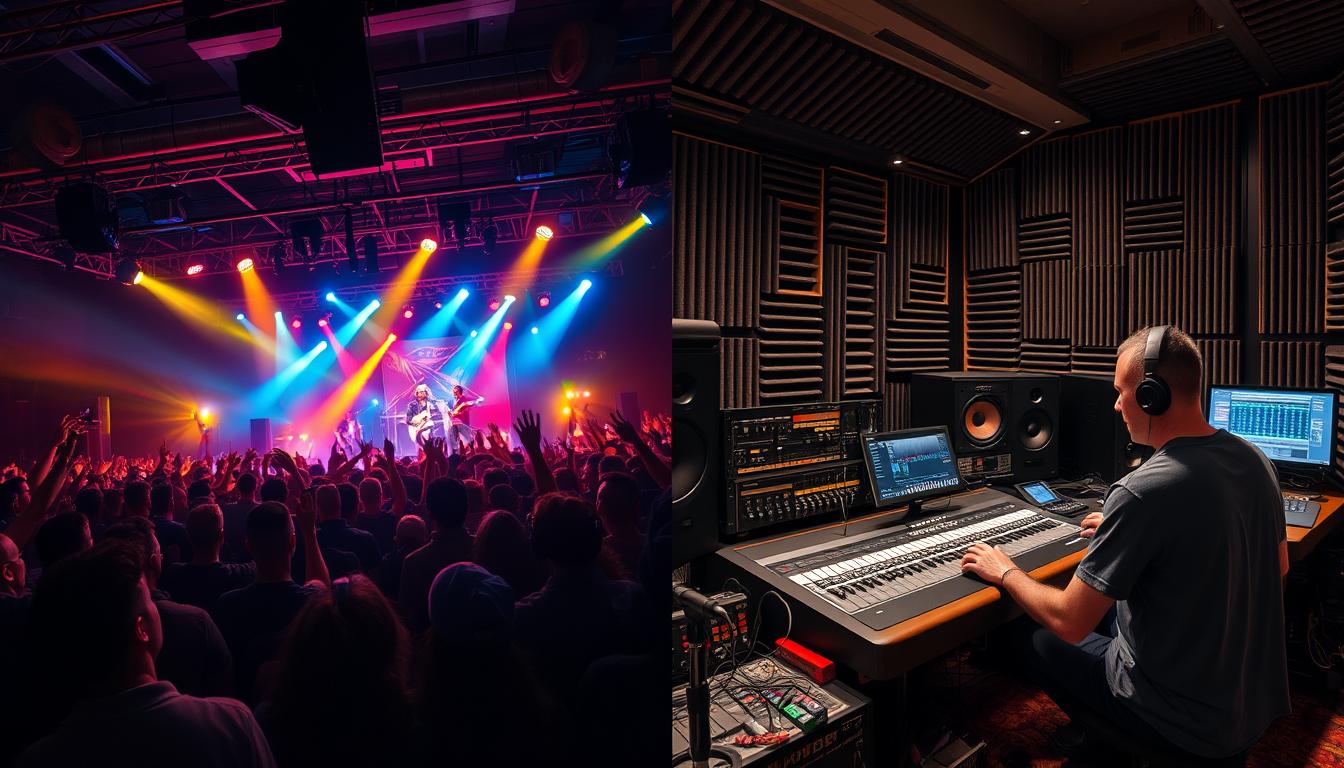As a music lover, I often think about the debate between live and studio audio. Which one sounds better? This question has made music fans and musicians curious. I’m excited to look into it in this article.
Live music has a special charm with its energy and spontaneity. The crowd feels the excitement, the connection between the artist and the audience, and the unique moments. Studio recordings, on the other hand, offer a perfect sound. This sound is hard to match in a live show.
We will look into the main differences between live and studio mixing. We’ll talk about the acoustic challenges and chances in live shows. We’ll also see how it affects the audience and the performers. By the end, you’ll know which music production method gives the better sound.
Understanding the Differences Between Live and Studio Mixing
I’ve worked as a pro audio engineer in both live and studio settings. These two areas share some basics but have big differences. The main difference is time. In studios, I can prepare carefully and fix any issues before recording starts. Live events have a tight schedule, with no time to waste.
Time Constraints and Preparation
Soundchecks are key in live mixing. They let me check the gear and make sure everything works well. But, even with good planning, things can go wrong during a show. I must think fast and solve problems on the spot. In studios, I can work slowly and carefully. Live mixing needs quick thinking and being ready to change plans.
Gear and Mixing Consoles
Live and studio mixing use different gear and consoles. Live shows often use simple digital or analog boards. This makes mixing faster and easier. But, it means losing some of the detailed control you get in studios.
| Live Mixing | Studio Mixing |
|---|---|
| Tight timeline, quick troubleshooting | Flexible timeline, meticulous preparation |
| Simplified gear, digital or analog consoles | Complex, multi-layered studio setups |
| Adaptable, nimble approach | Nuanced control and precision |
Acoustic Challenges and Possibilities in Live Settings
Live sound engineering is like navigating a changing acoustic world. It’s different from a recording studio. Concert venues have their own set of challenges. They need a deep understanding of live venue acoustics. As a live mixer, I’ve learned it’s key to manage room reflections and crowd dynamics for great live sound.
Managing Room Acoustics and Crowd Dynamics
Live venues have big open spaces. Sounds bounce off walls and ceilings, making the sound bigger and more immersive. But, the room’s acoustics change when the audience arrives. I must adjust gain and EQ levels to fix the sound.
The crowd affects the live sound too. When people fill the venue, their bodies change how sound waves move. I need to keep an eye on this and adjust quickly. This keeps the performance clear and engaging for everyone.
| Acoustic Factor | Studio Environment | Live Venue |
|---|---|---|
| Room Reflections | Controlled, minimal | Expansive, dynamic |
| Crowd Impact | Negligible | Significant, constantly changing |
| Mixing Approach | Focused on achieving a polished, balanced mix | Adaptive, constantly adjusting to environment |
Live sound engineers can make a show immersive and engaging by understanding live venue acoustics. It’s key to manage room reflections and crowd dynamics well. This makes the live performance truly connect with the audience.
Capturing the Raw Energy of Live Performances

As a live audio engineer, my main goal is to catch the raw energy of live music. Live shows are different from studio recordings. They have pure emotion and energy that grabs the audience.
To get this energy into the audio mix, I must be quick and flexible. I can’t add energy later. I watch the artists and adjust the mix to match their energy.
If the lead singer is moving a lot, I make sure their mic is in the right spot. I also adjust the rhythm section to match the performance’s intensity. Small changes to reverb and compression help bring out the live energy.
It’s a tricky job, but when done right, it makes a live recording feel like you’re there. The audience feels the energy through the speakers. That’s the magic of live mixing.
live vs studio audio: The Audience and Performer Experience

When comparing live and studio audio, the role of the audience and performers is key. Studio settings are controlled and quiet. Live mixing is about dealing with many personalities and the challenges of performing live.
Dealing with Different People and Personalities
Live mixing engineers must adjust to many personalities. They work with both new and experienced people. It’s about managing egos, taking criticism, and making sure everyone gets great sound.
The audience’s energy changes the live show a lot. Things like crowd energy and reactions affect the performance and how the performers do. Engineers must pay attention to this and adjust on the fly to keep the show great.
For performers, live shows are tough, even for pros. The rush of adrenaline and the unpredictability of live shows can be hard. Engineers need to help performers stay calm and supported during the show.
| Audience Experience | Performer Experience |
|---|---|
|
|
The live and studio audio experiences are more than just mixing. They’re about handling the complex social parts of live shows. By understanding these challenges, live mixing engineers can give everyone an amazing audio experience.
The Art of Live Mixing: Adapting to the Environment
As a live sound engineer, my main goal is to make the music sound great. But, live shows are different from studio work. They come with their own set of challenges. I must handle time limits, different equipment, and the sound of each venue.
Being able to adapt quickly is key. I face many challenges, like unpredictable crowds, bad room sound, or technical problems. My quick thinking and fast decisions are what make me good at my job. I always check the environment and adjust the mix as needed.
Being versatile with live audio is essential. I need to know how to use many different mixing consoles and equipment. Also, I must understand what each artist or band needs. This way, I can make sure everyone sounds great, no matter where we are.

